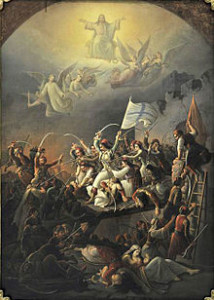1821-2021: Church and Freedom

March 25 is a major day in both our Orthodox faith and in our Greek culture. For the former, we celebrate the Annunciation – that blessed day when the Archangel Gabriel announced to Panagia that she would give birth to the Son of God, the cause of our salvation. For the latter, we celebrate Greek Independence Day – the commemoration of the successful revolution of the Greeks against the oppressive 400-year rule of the Ottomans.
This equivalence of dates is no coincidence: the feast day of the Annunciation was chosen as the day to start the Revolution so that the Mother of God could bless the fight for freedom. Indeed, the start of the Apolytikion for the Annunciation: “Today marks the crowning of our salvation…” is also applicable to the physical salvation and freedom that the Greeks valiantly fought for in the Revolution.
2021 is a particularly special year as it marks the 200-year anniversary of the commencement of the Revolution. As we close two centuries of liberation. It is essential that we reflect on the significance of this event, and the important role that the Church played in it, so that we do not risk forgetting a core part of our history.
The story begins in 1453 when the great city of Constantinople fell to the Ottomans. The great Byzantine (Eastern Roman) Empire, which had lasted for over 1,000 years, came to an abrupt and violent end. The Ottomans imposed harsh limits on the freedoms of the Greeks. These included limits on their ability to speak their language, to learn about their faith, and participate in the life of the Church. Orthodox Christians were treated as second class citizens with restricted rights and were pressured to abandon their faith and follow Islam. Unfortunately, many were tempted and succumbed to this pressure.
Throughout the entire period of oppression, however, the Church played a vital role in preserving Orthodoxy and the Greek culture. This preservation was a true miracle.
The Church, led by its Metropolitans and Bishops, established schools in their provinces and ran secret services to share the Holy Mysteries with the people.
This was also a period of martyrdom, with those who gave up their lives during this period known as the ‘neomartyrs’. Some famous examples are St George of Ioannina and St Gregory V, the Patriarch of Constantinople who secretly blessed the revolution. Their martyrdom gave continual courage to those around them. We should not forget, however, that those Orthodox who managed to keep their faith during this difficult period also lived a life of struggle and martyrdom. We should be moved and inspired by their example to continually struggle in hope.
The Church also played a pivotal role in the Revolution of 1821. Indeed, the proclamation of freedom was made by Bishop Germanos who blessed the flag at the Agia Lavra Monastery. There were many other Church leaders also involved in leading the Greeks to freedom: In addition to Patriarch Gregory V, Patriarch Cyril VI, Isaias of Salona, and Archbishop Kyprianos of Cyprus are just a few notable examples.
St Paul had proclaimed “Christ has made us free” (Galatians 5:1). Ultimately, the preservation of the Orthodox faith throughout Ottoman rule and the successful Greek Revolution were only possible through the grace and power of Christ and the intercession of the blessed Theotokos and other blessed Saints.
This struggle reminds us that there is a more important freedom than this physical freedom. That is the freedom which Christ gives each of us to be free from our passions and from the consequences of death. St Paul invites us in the passage immediately following the above, to emulate the spirit of the freedom fighters so as to let us “not be entangled again with a yoke of bondage.”
ΖHΤΩ Η ΕΛΕΥΘΕΡΙΑ! LONG LIVE FREEDOM!
Source: Lychnos February – March 2021
